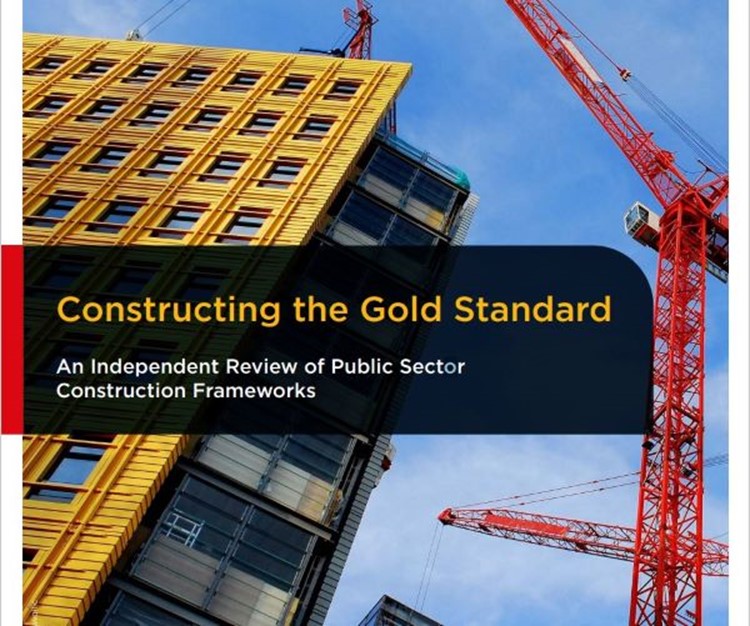
Delivering the ‘Gold Standard’ for construction
The government has announced the results of its review of public sector construction frameworks. Guto Davies explores the findings of the recently published Mosely Review.
The Cabinet Office has published Professor David Mosey’s review of public sector construction frameworks. Speaking at a Cabinet Office launch event on 18 January, Mosey introduced his findings, along with a series of recommendations and details of what changes are required.
Client and industry review contributors see frameworks as the best way to deliver improved project outcomes. Almost 70% say that is possible if they adopt clearer commitments to net zero carbon, whilst over 80% have highlighted the need for more active joint risk management, better support for SMEs and social value, and a whole life value model for projects.
The review was tasked with developing the components of a ‘Gold Standard’ against which new proposed frameworks and their contracts can be measured, standardised terms that support the new standard, and training packages to enable adoption of, what they have termed, a new ‘Gold Standard’.
We should welcome the fact that the review takes into consideration many of the recommendations and wider points made by ACE members. In both the short- and long-term, these member contributions will ensure frameworks deliver improved value for money, efficiency, safety, and perhaps most importantly within the context of procuring for value, social value.
The procuring for value agenda is vitally important to ACE members, particularly with regards to government interventions such as the construction playbook and the value toolkit. It’s why, as part of our planning for 2022, our policy team will be undertaking a ‘procuring for value’ project, assessing progress to date in this space.
This review is another important strand in that agenda. The 24 recommendations span the four interlocking stages of a ‘gold standard’ construction framework (better known as the four i’s), including strategy (intention), procurement (information), contract (integration) and management (incentivisation) and they build on policies set out in the Construction Playbook.
In consultation with its members, ACE submitted evidence to the review, and to the wider Cabinet Office consultation on Transforming Public Procurement, in March 2021. A key part of both submissions was around the question of open and closed frameworks.

At the time we argued that four year closed frameworks work well and we agreed with the need to allow new entrants to join after this time. While there is benefit in allowing a framework to run for up to eight years – with joining points in the second half of the term – it should be recognised that this is a long time in terms of costs, fee levels and even business models, which can all evolve over such a time frame.
We also emphasised that while frameworks are a useful way to avoid the cost and market inefficiency of constant retendering, they require honesty from both sides to avoid common frustrations emerging. The published review also emphasises the need for frameworks to prioritise safety and work towards our net zero ambitions. ACE supported this in our submission to the review.
It rightly argues that “in order to deliver government priorities and the Compact with Industry… framework providers, clients and suppliers make clear how their framework strategy, procurement, contract, and management will achieve improved building safety, net zero carbon targets, long-term relationships, fair returns, equitable treatment of risk, rewards for faster, better and greener delivery and collaboration at all levels of the supply chain.”
Our benchmarking analysis of the industry explores many of the issues covered by the review. For example, in our 2021 survey, shared with participants last month, we revealed that for large firms an average of 4.3% of fee earners’ paid hours were spent on bidding and marketing – a cost which could be substantially reduced with the adoption of this new approach.
The review recommendations have now been approved by the Cabinet Office for implementation, and that the gold standard will have to be met by all future construction frameworks with action plans to improve existing frameworks.
Around its publication Cabinet Office minister Lord Agnew said: “The new Gold Standard will make sure that vital public sector developments have rigorous measures in place to make sure public money is spent well and that projects are delivered successfully. This will be welcomed across the public sector, the construction industry and by the public, who have a right to expect the best possible public sector projects.”
It’s hard not to agree with Lord Agnew’s ambition and intentions. However, the industry will be all too aware that actions speak louder than words and it will be how these frameworks are implemented and picked up over the short to medium-term which will be the ultimate arbiter of success.
To coincide with the report launch, the first ACE policy forum event of 2022 will focus on this very issue and I am delighted that David Mosey has accepted our invitation to be our special guest. Taking place on Monday 21 February between 11 – 11.45am and chaired by Neil Humphreys of Waterman, ACE’s lead on pipeline and procurement, the meeting will be an opportunity for members to hear first-hand about the review from its author.
Guto Davies is head of policy at the Association for Consultancy and Engineering.
End.
Green Infrastructure Week curates’ content from the entire ecosystem around green infrastructure from government and NGOs to respected commentators. We are partners with Infrastructure Intelligence who has supplied this article.
Feel free to share this content with your social media community using #GreenInfrastructureWeek
During Green Infrastructure Week we will host a programme of live and exclusive free-to-attend webinars. Stay in touch with event updates by registering here.